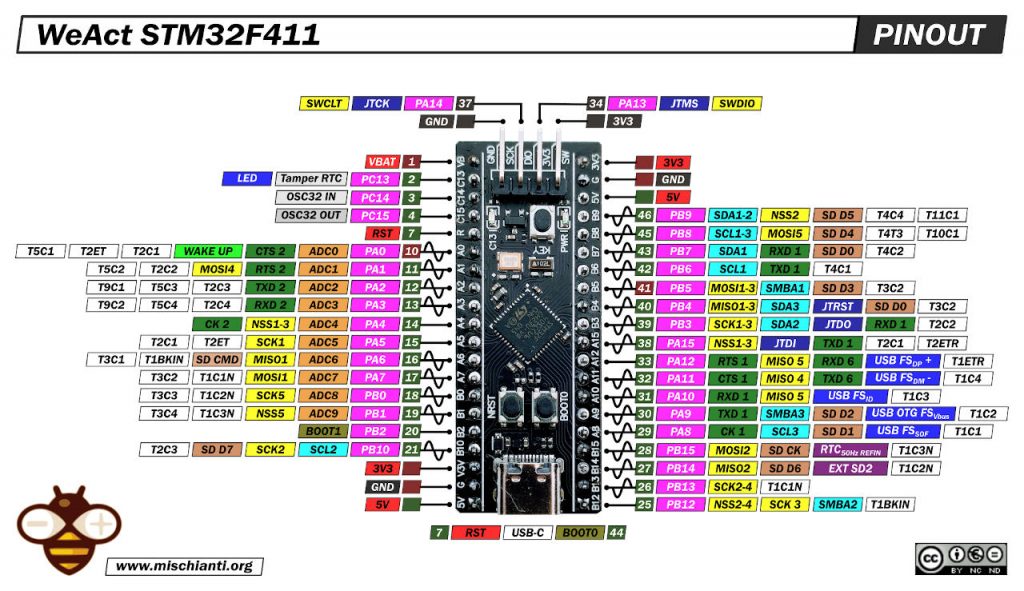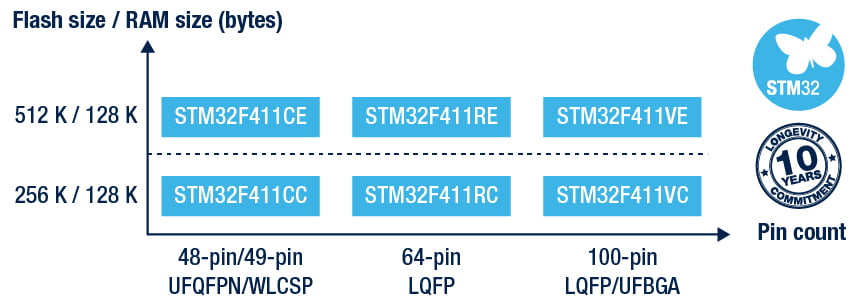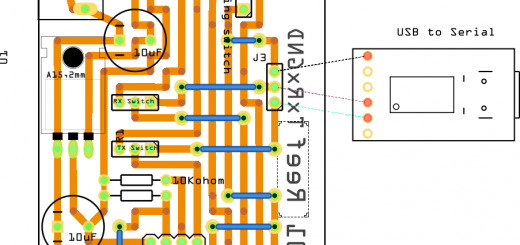WeAct STM32F411CEU6 Black-Pill: high-resolution pinout and specs
Link to the high resolution pinout image
Here the most used STM32 boards STM32F103C8T6 STM32F401 STM32F411 ST-Link v2 ST-Link v2 official
Description
The STM32F411xC/xE devices are based on the high-performance Arm® Cortex® -M4 32-bit RISC core operating at a frequency of up to 100 MHz. The Cortex®-M4 core features a Floating point unit (FPU) single precision which supports all Arm single-precision data-processing instructions and data types. It also implements a full set of DSP instructions and a memory protection unit (MPU) which enhances application security. The STM32F411xC/xE belongs to the STM32 Dynamic Efficiency™ product line (with products combining power efficiency, performance and integration) while adding a new innovative feature called Batch Acquisition Mode (BAM) allowing to save even more power consumption during data batching.
The STM32F411xC/xE incorporate high-speed embedded memories (up to 512 Kbytes of Flash memory, 128 Kbytes of SRAM), and an extensive range of enhanced I/Os and peripherals connected to two APB buses, two AHB bus and a 32-bit multi-AHB bus matrix.
All devices offer one 12-bit ADC, a low-power RTC, six general-purpose 16-bit timers including one PWM timer for motor control, two general-purpose 32-bit timers. They also feature standard and advanced communication interfaces.
The STM32F411xC/xE operate in the – 40 to + 125 °C temperature range from a 1.7 (PDR OFF) to 3.6 V power supply. A comprehensive set of power-saving mode allows the design of low-power applications.
These features make the STM32F411xC/xE microcontrollers suitable for a wide range of applications. (from ST)
Pay attention in the STM32411 series the pins 10 and 41 aren’t 5v tolerant (red square in the pinout diagram)
This board type offers a socket to the bottom to add and External SPI Flash, and SPI1 CS/SCK/MISO/MOSI (PA4/PA5/PA6/PA7) are Routed to footprint for external flash.
Specs
- Dynamic Efficiency Line with BAM (Batch Acquisition Mode)
- 1.7 V to 3.6 V power supply
- – 40°C to 85/105/125 °C temperature range
- Core: Arm® 32-bit Cortex®-M4 CPU with FPU, Adaptive real-time accelerator (ART Accelerator™) allowing 0-wait state execution from Flash memory, frequency up to 100 MHz, memory protection unit, 125 DMIPS/1.25 DMIPS/MHz (Dhrystone 2.1), and DSP instructions
- Memories
- Up to 512 Kbytes of Flash memory
- 128 Kbytes of SRAM
- Clock, reset and supply management
- 1.7 V to 3.6 V application supply and I/Os
- POR, PDR, PVD and BOR
- 4-to-26 MHz crystal oscillator
- Internal 16 MHz factory-trimmed RC
- 32 kHz oscillator for RTC with calibration
- Internal 32 kHz RC with calibration
- Power consumption
- Run: 100 μA/MHz (peripheral off)
- Stop (Flash in Stop mode, fast wakeup time): 42 μA Typ @ 25C; 65 μA max @25 °C
- Stop (Flash in Deep power down mode, slow wakeup time): down to 9 μA @ 25 °C; 28 μA max @25 °C
- Standby: 1.8 μA @25 °C / 1.7 V without RTC; 11 μA @85 °C @1.7 V
- VBAT supply for RTC: 1 μA @25 °C
- 1×12-bit, 2.4 MSPS A/D converter: up to 16 channels
- General-purpose DMA: 16-stream DMA controllers with FIFOs and burst support
- Up to 11 timers: up to six 16-bit, two 32-bit timers up to 100 MHz, each with up to four IC/OC/PWM or pulse counter and quadrature (incremental) encoder input, two watchdog timers (independent and window) and a SysTick timer
- Debug mode
- Serial wire debug (SWD) & JTAG interfaces
- Cortex®-M4 Embedded Trace Macrocell™
- Up to 81 I/O ports with interrupt capability
- Up to 78 fast I/Os up to 100 MHz
- Up to 77 5 V-tolerant I/Os
- Up to 13 communication interfaces
- Up to 3 x I2C interfaces (SMBus/PMBus)
- Up to 3 USARTs (2 x 12.5 Mbit/s, 1 x 6.25 Mbit/s), ISO 7816 interface, LIN, IrDA, modem control)
- Up to 5 SPI/I2Ss (up to 50 Mbit/s, SPI or I2S audio protocol), SPI2 and SPI3 with muxed full-duplex I2S to achieve audio class accuracy via internal audio PLL or external clock
- SDIO interface (SD/MMC/eMMC)
- Advanced connectivity: USB 2.0 full-speed device/host/OTG controller with on-chip PHY
- CRC calculation unit
- 96-bit unique ID
- RTC: subsecond accuracy, hardware calendar
How to
- STM32F1 Blue-Pill: pinout, specs, and Arduino IDE configuration (STM32duino and STMicroelectronics)
- STM32: program (STM32F1) via USB with STM32duino bootloader
- STM32: programming (STM32F1 STM32F4) via USB with HID boot-loader
- STM32F4 Black-Pill: pinout, specs, and Arduino IDE configuration
- STM32: ethernet w5500 with plain HTTP and SSL (HTTPS)
- STM32: ethernet enc28j60 with plain HTTP and SSL (HTTPS)
- STM32: WiFiNINA with ESP32 WiFi Co-Processor
- How to use SD card with stm32 and SdFat library
- \STM32: SPI flash memory FAT FS
- STM32: internal RTC, clock, and battery backup (VBAT)
- STM32 LoRa
- STM32 Power saving
- STM32F1 Blue-Pill clock and frequency management
- STM32F4 Black-Pill clock and frequency management
- Intro and Arduino vs STM framework
- Library LowPower, wiring, and Idle (STM Sleep) mode
- Sleep, deep sleep, shutdown, and power consumption
- Wake up from RTC alarm and Serial
- Wake up from the external source
- Backup domain intro and variable preservation across reset
- RTC backup register and SRAM preservation
- STM32 send emails with attachments and SSL (like Gmail): w5500, enc28j60, SD, and SPI Fash
- FTP server on STM32 with w5500, enc28j60, SD Card, and SPI Flash
- Connecting the EByte E70 to STM32 (black/blue pill) devices and a simple sketch example
Datasheet
Schema
Thanks
- Arduino
- esp8285
- esp8266
- ESP32
- DOIT ESP32 DEV KIT v1
- ESP32 DevKitC v4
- ESP32 WeMos LOLIN32
- ESP32 WeMos LOLIN32 Lite
- ESP32 WeMos LOLIN D32
- ESP32-wroom-32
- NodeMCU-32S
- ESP32-S
- ESP32-CAM
- ESP32-2432S028 (Cheap Yellow Display)
- ESP32-2432S032 (Cheap Yellow Display)
- ESP32 s2
- ESP32c3
- ESP32s3
- Arduino SAMD
- STM32
- Raspberry Pi













